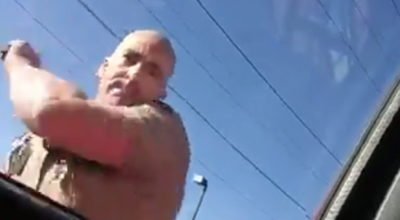

CHATTANOOGA, Tenn., April 1, 2022 — Judge Barry Steelman today warns Gregory Parker not to proceed in a serious criminal case without engaging an attorney.
By David Tulis / NoogaRadio 96.7 FM
It is a sobering series of questions Judge Steelman asks of the slouching, hands-in-pockets tradesman, sporting a shaggy beard and ponytail. It is a traffic case upon which a state trooper — the agency of which seems to have it in or Mr. Parker — has piled up a stack of felonies so tall the edifice nearly topples to the side.
It is a high-friction encounter in which Judge Steelman is cool and unrufflled, and in which Mr. Parker maintains his self-control better than he did in his arraignment in sessions court. In that encounter he snarled and did not have a plan to take initiative and get the case dismissed for lack of subject matter jurisdiction.
Mr. Parker insists he does not need assistance to handle 12 criminal counts in an indictment —
➤ Evading arrest, a felony, with up to four years in prison
➤ Reckless endangerment, felony, two years
➤ Retaliation for past acts, felony, two years
➤ Driving on a revoked/suspended license, six months
➤ Reckless driving, six months
➤ Expired or invalid registration of the car converting it into a motor vehicle, 30 days
➤ Texting while driving, 30 days
➤ Lack of proof of insurance, 30 days
➤ Failure to exercise due care, 30 days
➤ Speeding, 30 days
➤ Resisting arrest, six months
➤ Misuse of vehicle registration, 30 days
The trooper making the arrest March 29, 2021, in downtown Chattanooga is Dale Herring. The department of safety and homeland security appears to have long planned the arrest, and it acts without a warrant as required in Tenn. Const. Art. 1 sect. 7, the right to be arrested under a warrant, and in violation of Tenn. Code Ann. § 40-7-104, grounds for arrest by officer without warrant.
DOS spokesman Wes Moster did not answer questions Monday about THP policy on warrantless arrests and the scope of enforcement activity, which under statute is well less than what the agency directs its officers to perform. This reporter’s certified letter to Commissioner Jeff Long, sent June 16, 2021, has been ignored. My inquiry highlights seeming abusive treatment of officer Herring by his employer, rejection of the rights of members of the public, and asks general questions separate from the Parker case, on which the agency has declined comment.
Judge Steelman says if he is poor the state will assign Mr. Parker an attorney.
“I have no use for attorneys,” Mr. Parker says, interrupting him. “I do not need representation. I am a man who will handle his own affairs.”
Mr. Parker says sessions court did not establish subject matter jurisdiction, and that his oral and written objections on lack of subject matter jurisdiction have not been rebutted. He says his due process rights have been repeatedly violated. An earlier case before Judge Steelman was for the same alleged offense under the state transportation/trucking code (Title 55). Mr. Parker says he has not been in the purview of that body of law.
Tenn. Code Ann. § 55 and 65 are administrative law the state uses to regulate the departments safety and revenue as pertains to the taxable and regulable commercial use of cars, trucks, buses, motorcycles and trailers. Mr. Parker’s red pickup truck says “not for hire” on the back door, giving notice that he is not under a tax liability for his use of the roads.
“It was false arrest for him to pull me over. *** I’m acting in private capacity. I’m not to where I can be regulated,” Mr. Parker says. “I’m not in contract. I’m not in commerce.”
Judge Steelman says the talk he is having is part of the court system’s care for his rights, making sure he is properly defended, and making absolutely sure that he exercise his right to counsel or representation.
Judge Steelman raises a host of issues that a so-called pro se defendant faces. Has he read the rules of criminal procedure? Does he know about voir dire — selecting jury members? The difference between opening and closing arguments? Subpoenas? Getting a document from the DA? How to learn his options at various points in the buildup to trial day? How to question a witness or not to?
The judge in detail highlights “the risks associated with the refusal to be represented by an attorney.”
He might focus on one defense, and miss a better one without an attorney, the judge says. An attorney could help him see defects in the state’s case.
The prosecution won’t be has disadvantaged as will be Mr. Parker, he says. “The state has advantages over you from the beginning, do you understand that?”
Mr. Parker’s numerous previous arrests — drugs, DUI and other charges — will weigh against him in sentencing; is he aware of that? The judge asks.
But the accused says, “I’m standing on my rights and I’m not going to be convinced otherwise.”
Rights v. privileges
Mr. Parker is a principled constitutional patriot who believes he has a right to use the public right of way as a matter of right if he is not involved in the activity subject to the privilege for which the state police were created to enforce. Mr. Parker says he is not using the roads for private profit and gain but as a man using the roads to pursue his constitutional liberties. Mr. Parker mentions ultra vires activity by law enforcement statewide. I put the state on administrative notice about these abuses in 2018 via transportation administrative notice, a document of which Mr. Parker has made no use. The motor vehicle law is a foot wide, but is enforced as if it were a yard wide — scooping up all users of the road as if they were all subject to privilege enforcement. It is a fraud valuable for insurance and the police-industrial complex of related businesses.
The courts have rejected the idea of a right to travel. They accept travel, however, that exists in a change of domicile. This claim is a legal fiction. It overlooks that anyone may have rights exercisable through communication and movement. Free assembly. Religion. Free association. Earning a living. Right to bear arms. Abortion. Rights depend on the free movement of people as they are getting together at their convenience in various locations on the map. The absolute necessity of using cars for travel is highlighted by U.S. district judge Aleta Trauger in her orders in 2018 halting enforcement of a state law keeping people in home confinement if they had not paid court debt.
Judge Steelman saved the Parker hearing for the last person in the docket, figuring it might take a while to complete. It appears to have lasted more than an hour, with a trial date set for Oct. 4.


October 4? Whatever happened to the right of a “speedy trial”?